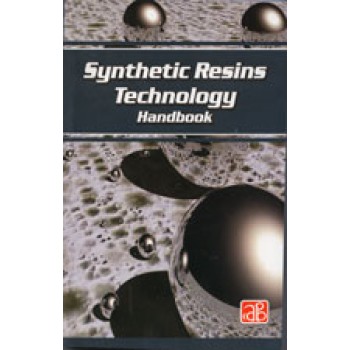Synthetic Resins Technology Handbook
| Price: | Rs.1,100.00 |
Detail Of Synthetic Resins Technology Handbook
| ISBN | 8178330261 |
| Pages | 588 |
| Language: | English |
| Product Code: | 1 |
| Size(in cm): | 21*13.5 cm |
| Weight(in grams): | 500(approx) |
Description:
Synthetic resin is typically manufactured using a chemical polymerization process. This process then results in the creation of polymers that are more stable and homogeneous than naturally occurring resin. Since they are more stable and are cheaper, various forms of synthetic resin are used in a variety of products such as plastics, paints, varnishes, and textiles. There are various kinds of synthetic resins; acetal resins, amino resins, phenolic resins, epoxy resins, fufuryl alcohol: resins, fluorocarbon resins, polyurethane resins, etc. Resins are polymeric compound which are available in nature and are also manufactured by synthetic routes. Some resins are also manufactured by partial modification of natural precursor polymer by chemical. The classic variety is epoxy resin, manufactured through polymerization, used as a thermoset polymer for adhesives and composites. Epoxy resin is two times stronger than concrete, seamless and waterproof. Various thermoplastic thermosetting polymers, including elastomers, have been incorporated to modify the properties for the cured epoxy resin products. Elastomers provide greater elongation and impact strength. Polysulfides, the most commonly used elastomer to flexibilise epoxy resins. Heat resistant polymers are employed for the various uses; heat flame resistant fibers plus ultra high strength, high modulus fibers; films, laminating varnishes and wire enamels; structural adhesives and molding powders. The Synthetic Resin Manufacturing industry initially enjoyed strong growth over its earlier history as plastics began to increasingly replace traditional materials such as wood, leather and metal. Plastic is estimated to have been the most used material globally.
The book basically deals with new raw materials for cost reduction of alkyds and unsaturated polyester, amino resins, polyester based resins, enzymatic synthesis of phenolic copolymers, radiation curable hybrid formulation, self polishing anti fouling, epoxy resins, epoxy resins from methyl epichlorohydrin, fillers, reinforcements, and other additives, cardanol modified epoxy resins, baking coatings from epoxy derived from cardanol, phenolic resins, polyurethane resins, aqueous polyurethane dispersion technology, heat resistant resins, etc.
The resin have wide industrial uses like in lacquers, paints, textiles, varnishes, printing inks and cosmetic etc. this book contains formulae, processes and applications of various resins. This book will be very resourceful to new entrepreneurs, consultants, technical institutions, libraries and for those who wants to venture into this field.
Reviews (0)
Write a review
Your Name:Your Review:
Note: HTML is not translated!
Rating: Bad Good
Enter the code in the box below:



 |
| 